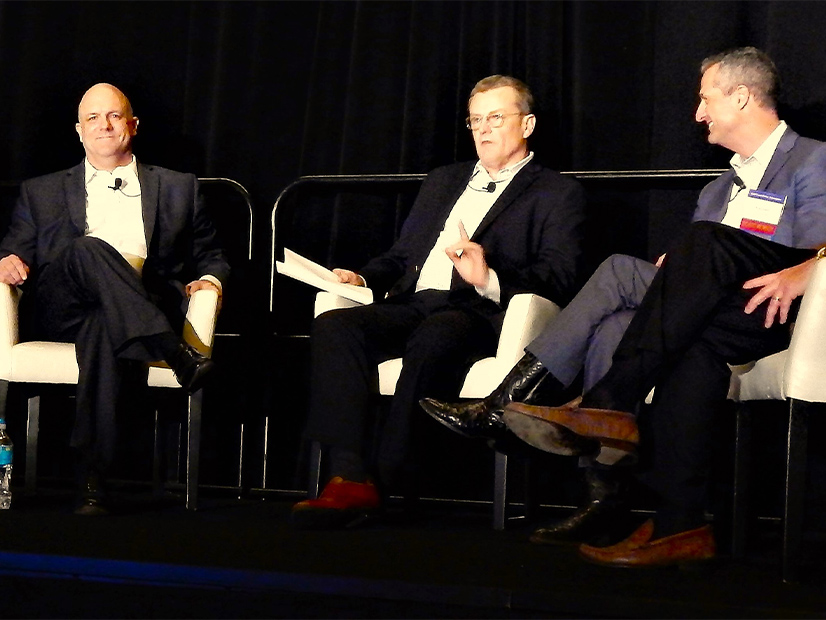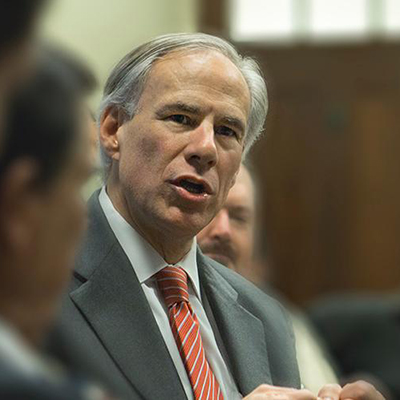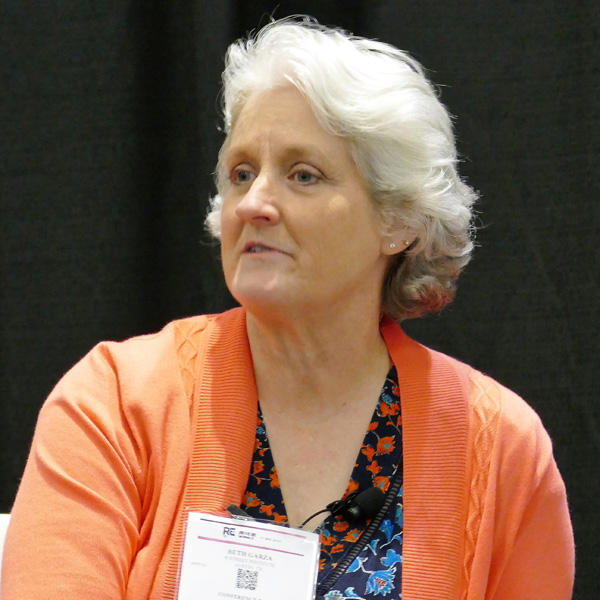
The ERCOT Board of Directors could finally unveil its choice to lead the Texas grid operator in its continued recovery from last year’s winter disaster.
The Texas Public Utility Commission has posted an open meeting notice, as it is required to do whenever two or more commissioners meet together, in advance of Tuesday’s board meeting. The notice indicates the commission will “receive information, and may give information and participate in discussion … and possible action regarding ERCOT CEO selection and ERCOT CEO compensation.”
 Texas Gov. Greg Abbott is said to be exerting unusual control over ERCOT. | Twitter
Texas Gov. Greg Abbott is said to be exerting unusual control over ERCOT. | Twitter
However, according to a well sourced article last week by The Texas Tribune, it is Texas Gov. Greg Abbott who wields the power to choose ERCOT’s next CEO. The Tribune reported that the governor, who is locked in a close re-election campaign with Beto O’Rourke and appealing to his base through a heavy reliance on Twitter, has nixed a search committee’s preferred finalist, former CAISO CEO Steve Berberich, and has unsuccessfully urged Phil Wilson, CEO of Lower Colorado River Authority, to take the position instead.
Berberich has been painted as a No. 1 draft pick because of his ISO and information technology experience. A Texan, he served as TXU Energy’s IT vice president before joining CAISO in 2005. He retired from the California grid operator in 2020 and currently lives in McKinney, Texas, according to his LinkedIn profile. (See CAISO CEO Steve Berberich Retiring.)
Those close to the search told the Tribune the only reasons they were given for Abbott’s veto is because Berberich’s last job was in California. Attendees at SPP’s Markets+ development session last week in Portland, Ore., expressed surprise when the story broke; Berberich had a reputation for speaking colorfully and directly, as he did toward the end of his tenure when he warned of California’s reliability problems.
Berberich apparently had strong support from the market and ERCOT’s board. The directors met in an urgent conference call July 29 that turned into a long executive session. They adjourned the call without voting on any matters.
If no announcement comes this week, it may have to wait until the board meets again in October. That would be perilously close to winter and its potential for more extreme weather. That is also about the time the PUC is expected to take up the second phase of its market design.
Alison Silverstein, an Austin-based energy consultant with regulatory experience at both FERC and the PUC, told RTO Insider she was “appalled” by Abbott’s move, which has not been denied. She said her criteria for picking ERCOT’s next CEO would be “someone with proven experience in running the grid.”
“I don’t care if the [next CEO] is from California or one of ours,” Silverstein said. “I want the best possible person with rock-solid reliability and policy experience and management experience, because the safety of all Texans is the most important factor. Can this person run ERCOT to move us all to a better place in terms of grid reliability?”
 Beth Garza, R Street | © RTO Insider LLC
Beth Garza, R Street | © RTO Insider LLC
Beth Garza, a senior fellow with public policy research firm R Street Institute and ERCOT’s Independent Market Monitor from 2014 to 2019, pointed to ERCOT’s statutory status as the “independent organization” responsible for managing the grid.
“There’s a reason for that,” she said Friday. “Most people would say that’s independent from the market participants and the industry. The other part of that independence is you want an organization that is focused on the best and most appropriate technological ways to deal with whatever the problems are.”
And so Brad Jones, who was appointed as ERCOT’s interim CEO in the wake of the February 2021 winter storm that almost collapsed the Texas grid, is left cooling his heels. What was supposed to be a three-month temporary assignment has now turned into a 15-month gig. Jones has consistently said he doesn’t want the job on a fulltime basis; he said in April that he planned to leave ERCOT in June. (See “Jones: Will Stay as Interim CEO,” Overheard at GCPA’s 2022 Spring Conference.)
“I want to ensure they get the right person into this role,” he said during the Gulf Coast Power Association’s Spring Conference.
It is now August, and Jones is still waiting.
According to the Tribune and confirmed by ERCOT staff, the PUC, with its Abbott-appointed commissioners, reviews and approves every piece of communications before the grid operator releases it. “ERCOT does not speak for Gov. Abbott on what, if any, involvement he’s had,” has been staff’s response.
“The work of ERCOT is so important that I want its CEO and staff’s first priority to always be the integrity of the reliability of the ERCOT power system, minute to minute, every single day,” Silverstein said. “They should be able to operate our grid without having to care about the consequences of political agendas. The CEO’s first job is to make all the essential decisions to protect grid reliability … to run the organization that ensure the reliability of the grid and its resilience. If the CEO has to ask permission to take actions to protect the grid, we’ll lose the grid. We cannot have second guessing.”
Garza agreed, saying, “Politics and power system engineering may not be the best combination.”
Energy Advisory Committee OKs Report
The State Energy Plan Advisory Committee (SEPAC), referred to as a “little-known board of energy executives, oil and gas entrepreneurs and power utilities officials” by The Dallas Morning News, also raised consternation with industry observers last week as it held its second meeting.
The committee was created by legislation passed last year and charged with preparing a “comprehensive state energy plan” that evaluates barriers preventing “sound economic decisions” and the ERCOT market’s structure and pricing mechanisms. The plan, due to the state legislature Sept. 1, must also look at ways to improve the grid’s reliability, stability and affordability.
The committee comprises 12 members appointed by Abbott, Lt. Gov. Dan Patrick and House Speaker Dade Phelan. Chaired by LCRA’s Wilson, its members include NRG Energy’s Bill Barnes, Pedernales Electric Cooperative CEO Julie Caruthers Parsley and Oncor’s Daniel Hall, as well as consultant Joel Mickey and Mike Greene, retired staffers from ERCOT and Energy Future Holdings, respectively.
“Conveniently, the governor chooses Phil Wilson as the chair, because he’s got a large organization [behind him],” Garza said, noting SEPAC’s lack of resources.
The other members come from outside the electric industry, with their lack of expertise exhibited when Patrick Jenevein — with some wind development experience at a small Chinese clean energy projects company (Tang Wind Energy) but primarily focused on natural gas — suggested that coal is a renewable resource, according to energy consultant Doug Lewin.
Lewin was among public onlookers during Wednesday’s meeting, when SEPAC approved a draft of its report 7-5. At least one committee member voted against the draft because of a lack of time to review it, Lewin reported.
The report includes a recommendation that renewable resources be required to provide backup energy, despite thermal resources’ well documented contribution to the dayslong power outages after the winter storm. (See FERC, NERC Release Final Texas Storm Report.)
The report itself has not been publicly released, part of a pattern of secrecy surrounding SEPAC. Its meetings have been posted on the secretary of state’s website, which requires a sophisticated expertise with searches, but they were not livestreamed.
“I’m concerned about the legislature getting advice on something as important as electricity and natural gas policy from an organization that has met only twice and whose [members] haven’t had a significant amount of time to review the material that was developed,” Silverstein said, adding that its members were voting “blind.”
SEPAC “took a vote without the members being able to actually review the contents in detail,” she said. “So, if I were in the legislature, I would use this report, whatever it will ultimately contain, as just another piece of paper. I would not attach any significant weight to it.”
Garza was among several subject-matter experts who testified before the committee during its June meeting. She said at the time she thought it was a “check-the-box exercise” and would amount to little. However, Garza said she found the discussion to be “very valuable” and found herself wishing the PUC “would put themselves in a position to hear that kind of input and discourse.”
“There’ll be a report that goes to the legislature. I have every confidence it’s a report and will be written and given to the legislature,” she said. “What will it contain? Will the contents of that report be meaningfully developed with debate back and forth? No. They took input during one meeting and a second meeting to look at the document.
“You can’t just say, ‘I like a policy; let’s do it without doing an extraordinarily detailed analysis,’” Silverstein said. “It is my hope that the legislature will not jump too quickly to adopt any superficially appealing policy path, but rather rely on the kind of research and analysis on implications and alternatives that can truly give us reliability and affordability and resilience, rather than to catchy headlines.”



